 Back
Back

DIGIRES presents the first report on current issues, methodologies, and needs in anti-disinformation actions in a small state. It provides an up-to-date analysis of actions to combat disinformation aimed at promoting the digital resilience of Lithuanian society, and proposes the idea of multisectoral integration and multistakeholder partnership.
In the report, prepared by the Baltic Research Foundation for Digital Resilience DIGIRES, scientists shared expert knowledge and insights based on scientific evidence about the situation of the spread and impact of disinformation in Lithuania and other Baltic countries from the perspective of a small state.
The report not only summarizes the knowledge, research and survey results about disinformation in Lithuania and the Baltic States, but also discusses the steps and actions of the state policy, provides expert insights on what and how should be done, and provides guidelines for further research.
“Although recent years we have been talking a lot about the need to increase society’s resistance to various threats, both psychological and informational, we are still missing a clear political direction, what is actually planned to be done so that society could gain stronger immunity to phenomena, such as disinformation and information manipulations”, – emphasizes DIGIRES project manager and chief researcher, one of the main authors of the report, VMU professor Auksė Balčytienė.
According to the scientist, the DIGIRES initiative, which has been existing for one year, aims to show ways of developing the resilience of society in a consistent and purposeful way, looking for new forms, through agreements and cooperation between the non-governmental organisations and state institutions representing different sectors. DIGIRES argues that society‘s resilience to information disorders needs to be viewed as a collaborative governance process characterized by new forms of cooperation between stakeholders: government institutions (macro level), media, cultural organisations (mezzo level) and citizens (micro level).
“The DIGIRES association has been operating just for one year, but this time was enough to see that important goals, such as dissemination of ideas, awareness, public involvement, can be achieved only through cooperation and sharing of expert knowledge. Collaborative governance creates a system that allows everyone to work together, share experiences, refine problem solving methods and act purposefully”, says A. Balčytienė, professor of the VMU Department of Public Communication.
Among the DIGIRES proposals for the development of digital resilience and citizenship are the strengthening of the community of professional media, journalists and fact-checkers, and increasing the media literacy of citizens. Equally important is the involvement of the academic community, the promotion of scientific research and technological innovation in this area. It is urged to involve the national universities, scientific research institutes, scientists and research associates in these activities as widely as possible. It is also important to encourage cultural institutions, such as libraries, schools and museums, as well as youth workers and non-governmental organisations, representing digital media literacy and resilience promotion networks, to involve in collaborative governance activities and to reach the most remote regions of Lithuania through them as widely as possible.
DIGIRES: Multisectoral and Multistakeholder Foresights Towards Resilient Digital Citizenship in Lithuania (state of the art)
For more information write via e-mail: aukse.balcytiene@vdu.lt